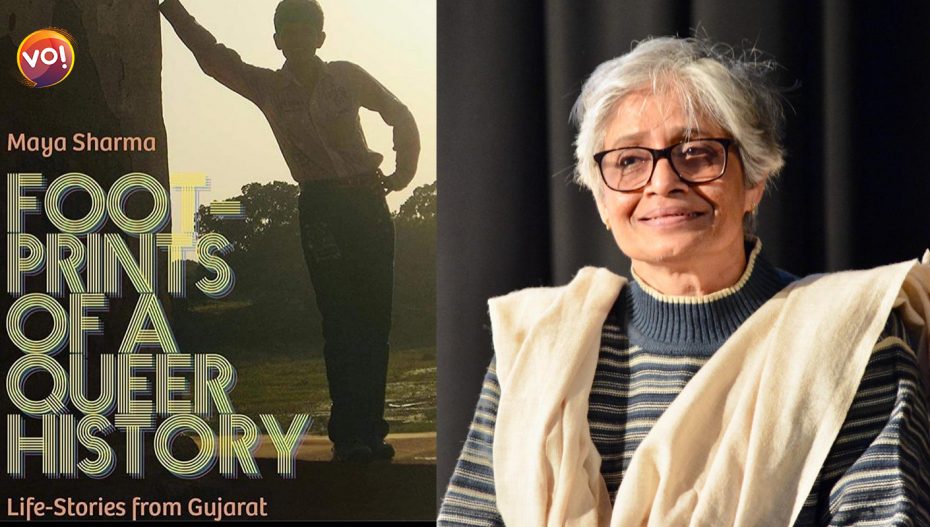There’s no dearth of LGBT stories in the media these days. Celebrities in various fields are coming out in numbers. The courts are stepping in to protect LGBT rights. The month of June, which is gay pride month, will see marches organised in cities across India. Mumbai is currently hosting its annual Kashish Queer Film Festival, with the support of Morgan Stanley and Axis Bank. In the midst of all this, Maya Sharma is a different voice. The Vadodara based activist-author writes not of the privileged urban elite but the poor, working class LGBT women from villages and urban slums. Her new book, “Footprints of a Queer History: Life Stories from Gujarat” features 11 case studies of LGBT women who she met in the course of her work with Vadodara’s Vikalp Women’s Group. In an exclusive interview with VO! Maya talks about trans-masculine identity, marriage as an institution and promises people make on the banks of the Mahi River:
VO!: What is the genesis of your new book?
Maya: My earlier book “Loving Women: Being Lesbian in Underprivileged India” was published in 2006 and told the story of ten working class lesbian women. A lot of water has flowed in the Mahi since then. Article 377 has been struck down. Movies like “Badhai Do” are being made. I wanted to update the theme with new examples.
VO!: Are the LGBT women featured in your book all from Vadodara?
Maya: Not at all. They are from places as far away as Junagadh and Navsari. But I don’t specify the place in the book because I promised them anonymity. And the people in the book are not all women. In fact, most of them are trans-masculine. They identify as men, though they are biologically women.
VO!: Trans-masculine is a group that is seldom written about…
Maya: That is partly because the line between trans-masculine and lesbian is so blurred, it makes coming out difficult. It’s an issue of identity versus sexual preference, something that is difficult for people to comprehend. Trans-feminine is more mainstream because of our hijra tradition. But trans-masculine individuals are actually quite a visible minority in urban centres. They have the freedom to move about on the streets without harassment, since they look and behave masculine. They are visible in the countryside as well and people just say “chhokri jo chhokro chhe.”
VO!: Does the book feature Gujarati traditions that relate to LGBT culture?
Maya: In Gujarat, there’s a tradition whereby people go to the banks of the Mahi River to make a confession, to tell the truth. Queer people make use of this tradition. I have known many same-sex couples who go there to make promises to each other. Gujarat has produced works of literature like “Niranjan” by Jhaverchand Meghani, which is about a gay relationship. I’ve written about a lady from a very well-to-do family in Ahmedabad, born in 50s, who had a lesbian relationship the ended tragically. She was murdered in 2002.
VO!: Do working class LGBT women inevitably get married?
Maya: Marriage is a complex institution, tied to religion, caste, property, children. Most marriages are arranged, so expectations are limited. Living alone can be hard for a woman. But human beings always find a way to love. Muslim and Adivasi women are practical about marriage. I have met many who have left their husbands or had relationships outside the marriage. In one case, a woman has formed a relationship with another woman her husband was seeing. Many of the stories in the book question the notion of monogamy.
VO!: Tell us about your own coming of age…
Maya: I was born in a village in Chittorgarh, Rajasthan and studied in Ajmere. I got married out of choice at the age of 24. Those days it was compulsory for a woman to get married. Till then, I had had some crushes on other other women, but I thought it was a passing phase. I thought it wasn’t true. There was no one to tell me it was true. I lived in Delhi and was married for ten years and have a son who accepts me. Now I live with my partner in Vadodara.
VO!: Is Vadodara a liberal city?
Maya: For its elite, it is very liberal. But for the most part, Vadodara is a small city caught between being open and closed. Ahmedabad, on the other hand, is a large city where you can live anonymously. You can get rented accommodation without hassles and people don’t pry into your private life.
VO!: Your new book is available on Amazon only in a Kindle edition. When will the print version be out?
Maya: My publisher tells me it will be out soon. Even I don’t have a hard copy of the book.
VO!: Do you have another book planned?
Maya: I’d like to write about Gujarat’s old houses and their architecture. But who knows, I might write another book on the women I meet in my work. Sometimes, people just lure you into writing about them.
Also Read: Celebrating Pride Month with Indian Cinema Characters












